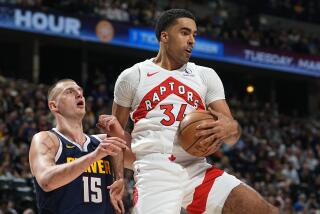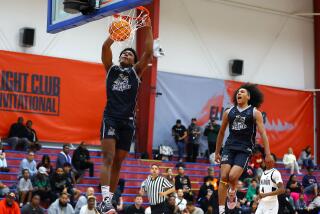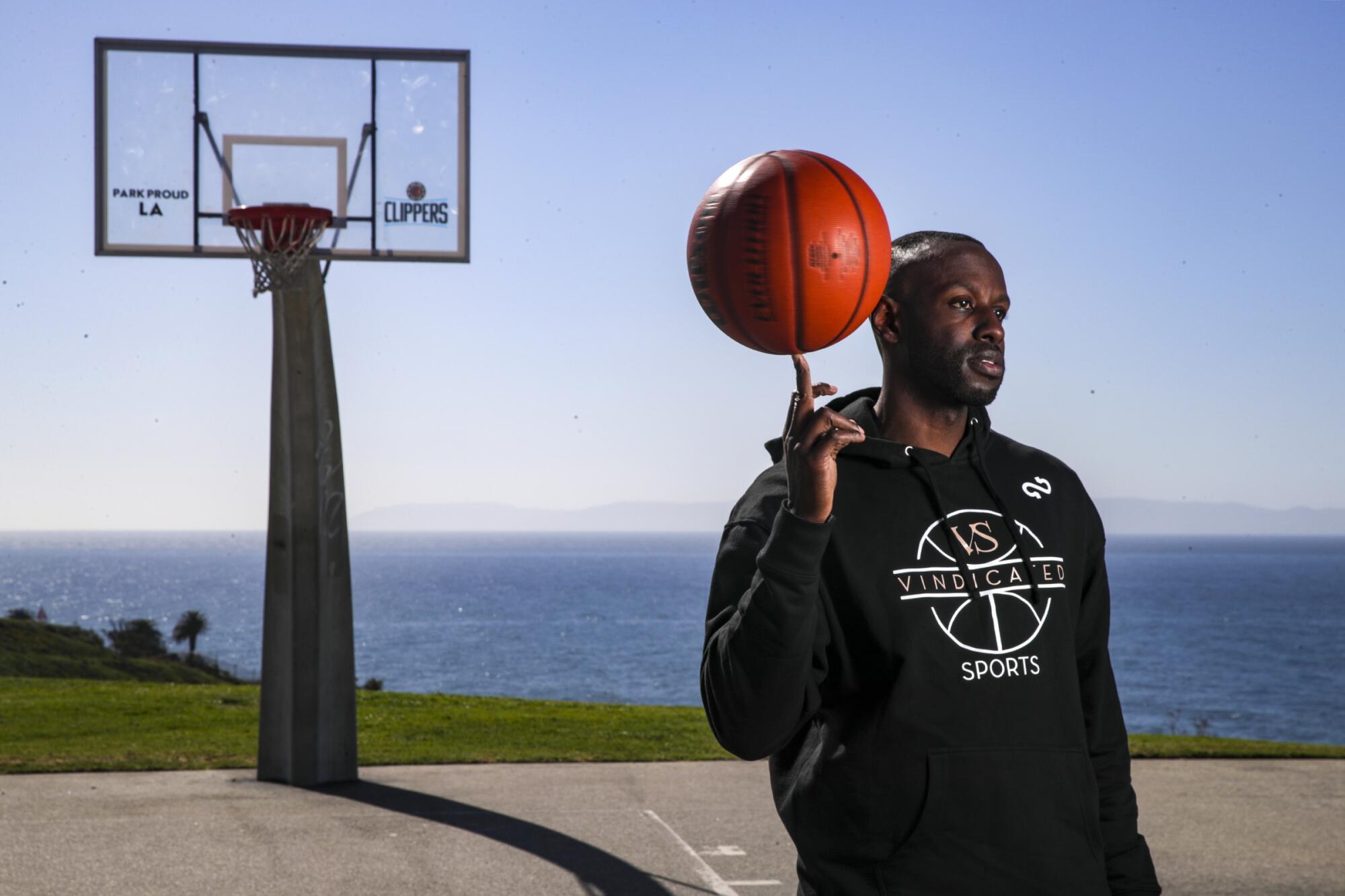
- Share via
Justin Pierce wasn’t coming back.
He’d spent four years bouncing around Los Angeles gyms — even living in one — just for a shot at a professional basketball career. He’d spent the two years before that, following a playing career at Averett University in Danville, Va., saving his pennies for G League tryouts. He’d been scammed, swindled and sucked into the maw of the money machine that is the below-deck professional basketball world and spit out without so much as a place to live.
But in September, the 32-year-old Pierce was summoned by Mike Creppy, chief executive of the L.A.-based international consulting firm Vindicated Sports, to accompany the agency to a showcase in Uruguay. Coming off a five-month stint in Costa Rica where he’d averaged more than 30 points a game for the Caribe Jaguares, Pierce was determined to earn a deal by any means necessary.
He bought a one-way plane ticket. He wasn’t going home empty-handed. Not again.
“I was like, ‘There’s no way I’m missing this,’” Pierce said. “I ain’t have no money to come back anyways.”
There’s a certain class of hardcourt grinders in Los Angeles that exist between the margins, between G League and semipro, who strive for a chance to play in another country. According to the RealGM website, more than 80 players from L.A. alone have played overseas. Some are former NBA pros such as Jordan Farmar, two-time NBA champion with the Lakers. But many, like Pierce, are small-college products with divergent resumes.
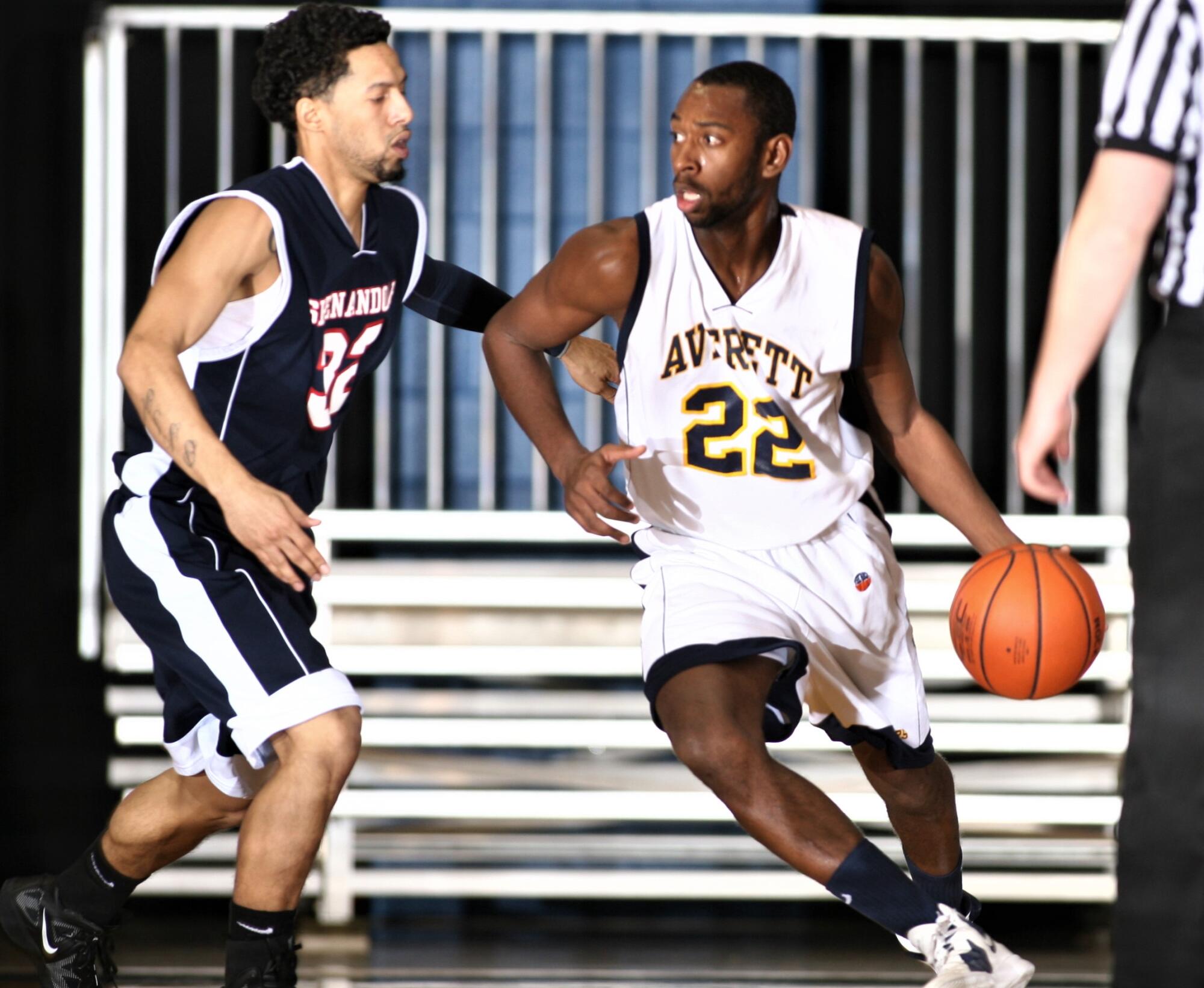
For them, playing overseas is a Holy Grail, one with no clear GPS route. The business is cutthroat, players say. If you aren’t careful, a player can end up dead broke or stuck halfway across the world spinning his wheels.
“It’s almost like running with no finish line,” Creppy said. “They don’t know where they’re running to.”
::
Coming out of Averett, Pierce had no plan. Few players do when they don’t have a direct path to the NBA.
Yet he believed his calling in life was to play professional basketball, and after two aimless years on the East Coast, Pierce back moved to Southern California to focus on training.
The basketball part was one thing. Living was the more pressing issue. After his roommate situation soured, Pierce moved into his trainer’s office space in a local gym. It was smaller than a dorm room and had no windows.
What it did have, however, were glorious photos of NBA legends hanging on its walls. Michael Jordan, Magic Johnson and Larry Bird would sneer down at Pierce every day.
“You look at yourself, and it’s like, man, dude, you don’t got no car, you don’t got no job,” Pierce said. “I’m in a gym. I’m homeless, bro.”
For many in Pierce’s situation, injury or personal circumstance threw a wrench in plans for a pro career.
Former Panorama City St. Genevieve High player Marcel Burton, 23, was hurt his senior year at Division II Lincoln University in Jefferson City, Mo., and has spent the last two years training in L.A. to put himself on the professional radar. Zena Edosomwan, 28, was a top-100 recruit at Studio City Harvard-Westlake High, graduated from Harvard and then spent two years rehabbing from knee injuries.
“It’s like the wild, wild west. What’s setting you apart?”
— Zena Edosomwan, former high school and college basketball star on making it as a professional player.
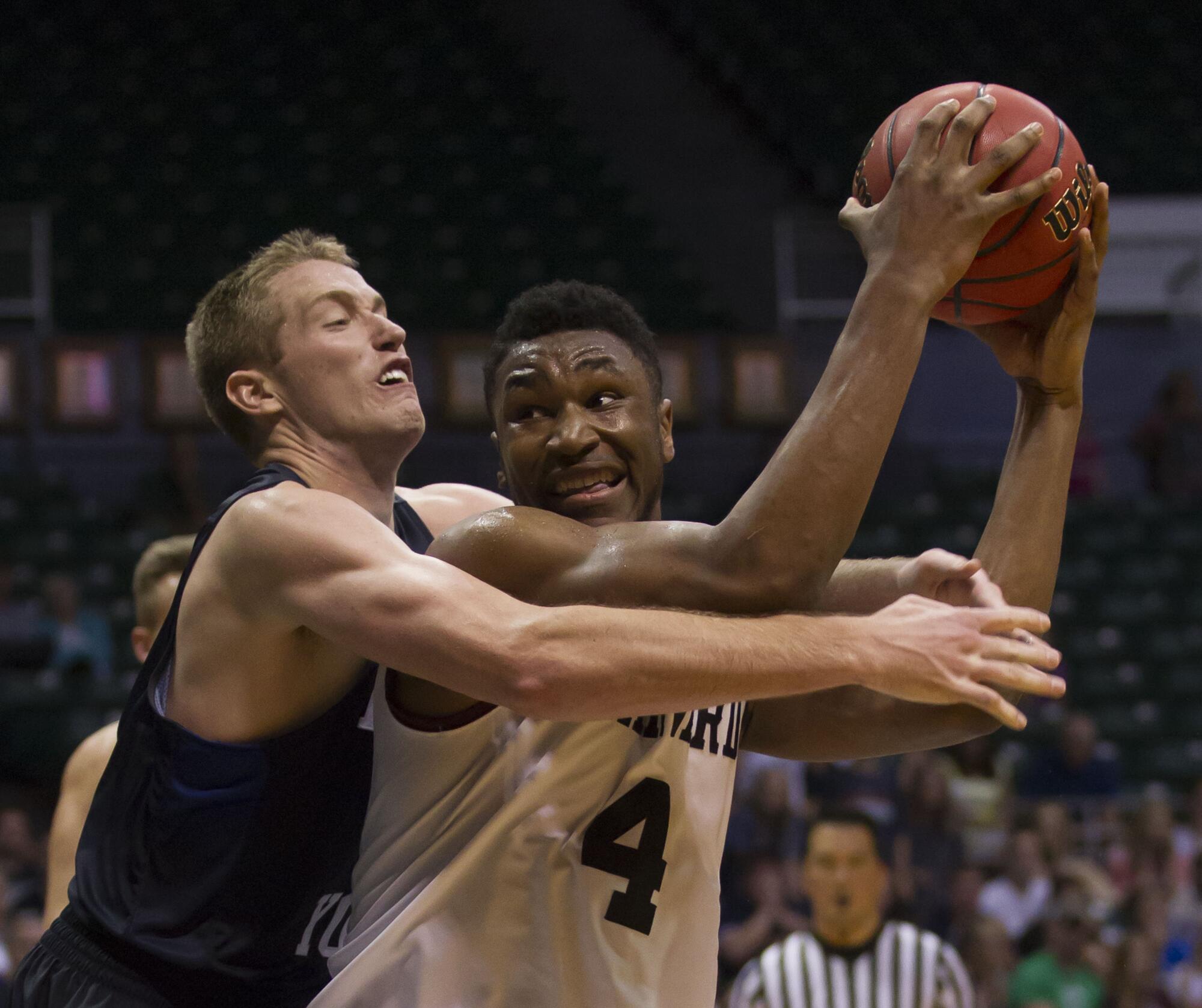
Creppy, an overseas veteran of more than a decade, had his hopes for a promising career at UC Riverside dashed when he suffered a nasty shoulder separation after a car crash that killed a teammate.
They weren’t willing to give up on their dream, and playing overseas offered a chance to make a living. But most clubs have a roster quota for United States imports. Battling for a spot overseas is incredibly competitive, said Edosomwan, who is just beginning a stint in Canada.
“It’s like the wild, wild west,” Edosomwan said. “What’s setting you apart?”
Sacrifice. That’s what they all pointed to as a difference-maker — the willingness to struggle. To save money for a dream, rather than indulging in the extravagance that Los Angeles dangles like a carrot.
But that dream can make players trip over themselves rushing into an opportunity.
::
Clutching his phone and sunglasses, Creppy paced the sideline. He turned away from the squeaks of sneakers behind him, holding the phone close to his ear.
“Why do you have to fly from Thessaloniki to Tbilisi?” he asked Joshua Nurse, the voice on the line. “Uh-huh. Are you sure?”
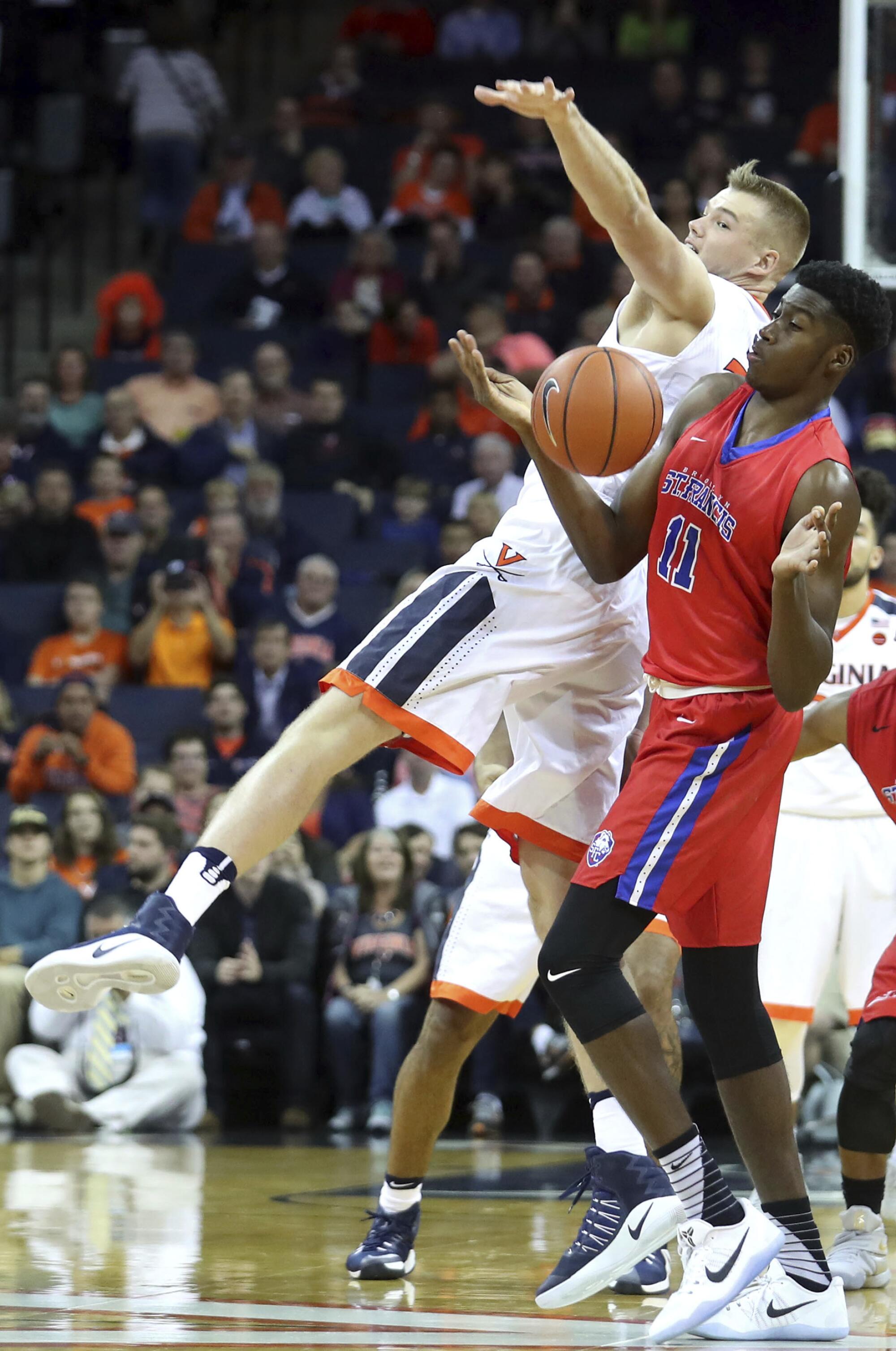
His attention is abruptly diverted from watching Burton train in a sweaty Chatsworth gym. Nurse, at that moment marooned in North Macedonia while playing for the KK Kosuv of the Prva Liga, is in crisis mode.
“They never got your visa?” Creppy said, voice rising ever so slightly. “Oh yeah, we’ll get you out of there.”
Improper documentation could have led to a border patrol stopping Nurse before his flight, asking why he’d been in the country for more than three months without a visa. Creppy knows his client could be spending the night in a frigid holding cell. He’d seen it happen before.
So he pulled up Nurse’s contract on his phone, pinching the screen with two fingers. Satisfied with a solution, Creppy placed the phone to his mouth and uttered a firm set of directions: Tell the club you are requesting an immediate termination of the contract because of improper visa filing and late payments.
He hung up, a tired smile peeking at the corner of his mouth.
“It’s every day,” Creppy said.
Creppy warned Nurse about taking this contract. The big man, averaging just two points a game with KK Kosuv, had rushed into a commitment out of eagerness.
It’s a trap Creppy sees overseas hopefuls fall into repeatedly. In 2017, Creppy launched Vindicated and published a guidebook for playing overseas because he wanted to help players who’d experienced the same pitfalls he had.
At every fork in the road, there’s a club offering a contract full of red flags, an agency offering representation that will accept money and turn silent, a showcase offering exposure that ends up being “pointless,” as Burton put it.
“There’s so many dishonest and crooked people. It’s predatory.”
— Mike Creppy, on securing opportunities and contracts for players overseas
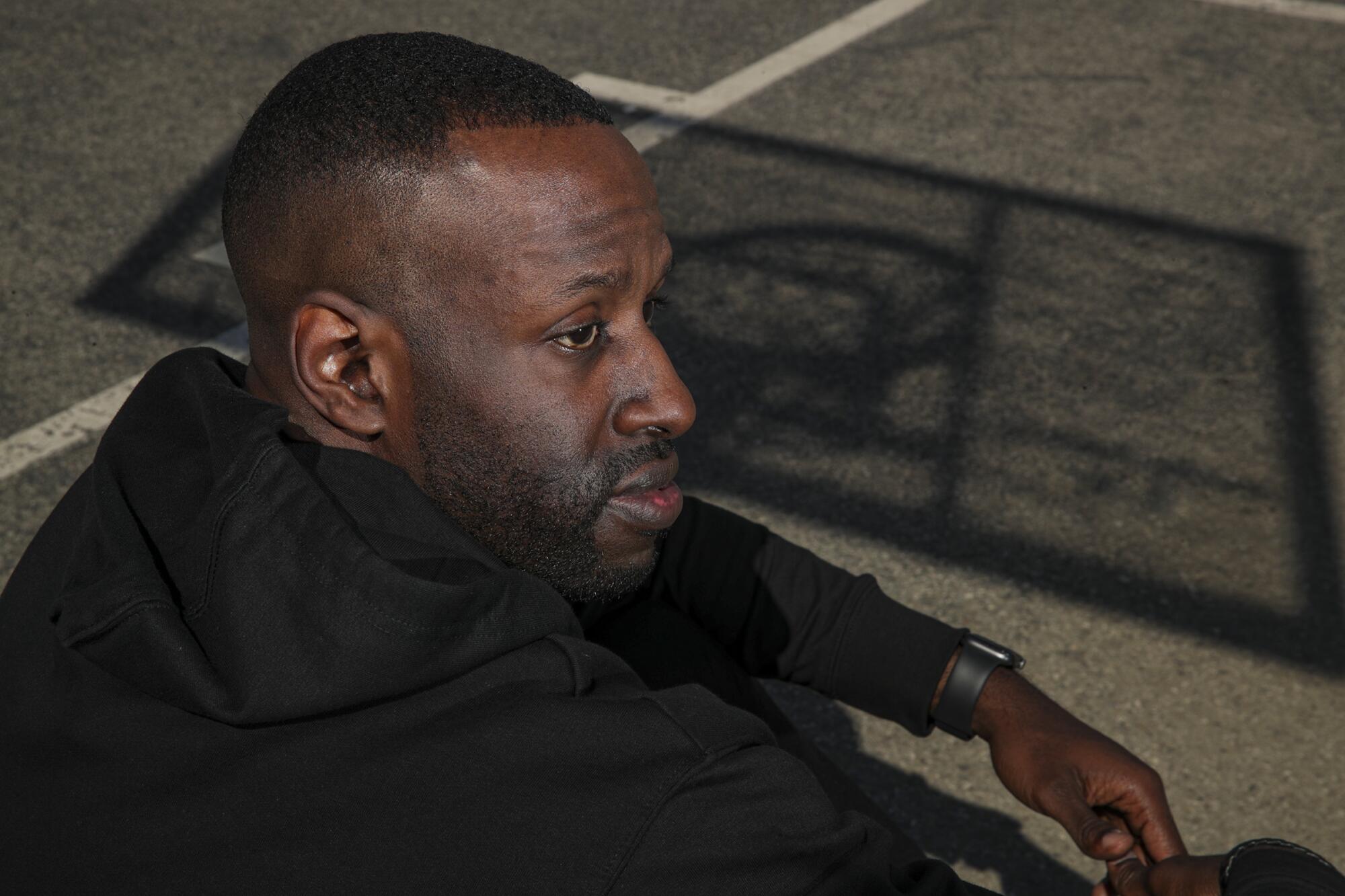
Out of the blue, a few years earlier, an email popped into Pierce’s inbox with an offer to play for a team in the Netherlands. It was a solution at a time he was technically homeless.
“I don’t know nothing at this point,” Pierce recalled. “I’m telling my trainers, like, ‘We did it!’”
The sender asked for money to get Pierce there. He scraped together what little cash he had, even reaching out to family members. But weeks passed with radio silence. Pierce grew suspicious.
After some online searching, the truth slapped him in the face: The company didn’t exist. The team name the email mentioned was associated with a scam. He’d just blown his limited funds on a long-awaited chance to play overseas that never existed.
“That was the first time I actually thought about quitting,” Pierce said. “I’m doing all this just to get scammed?”
“If you’re desperate and they smell blood,” he continued later, “they will sell you your dream.”
::
Pierce could’ve hung up the sneakers, moved back to Virginia, gotten a job at a T-Mobile or Sprint store. Could’ve had stability.
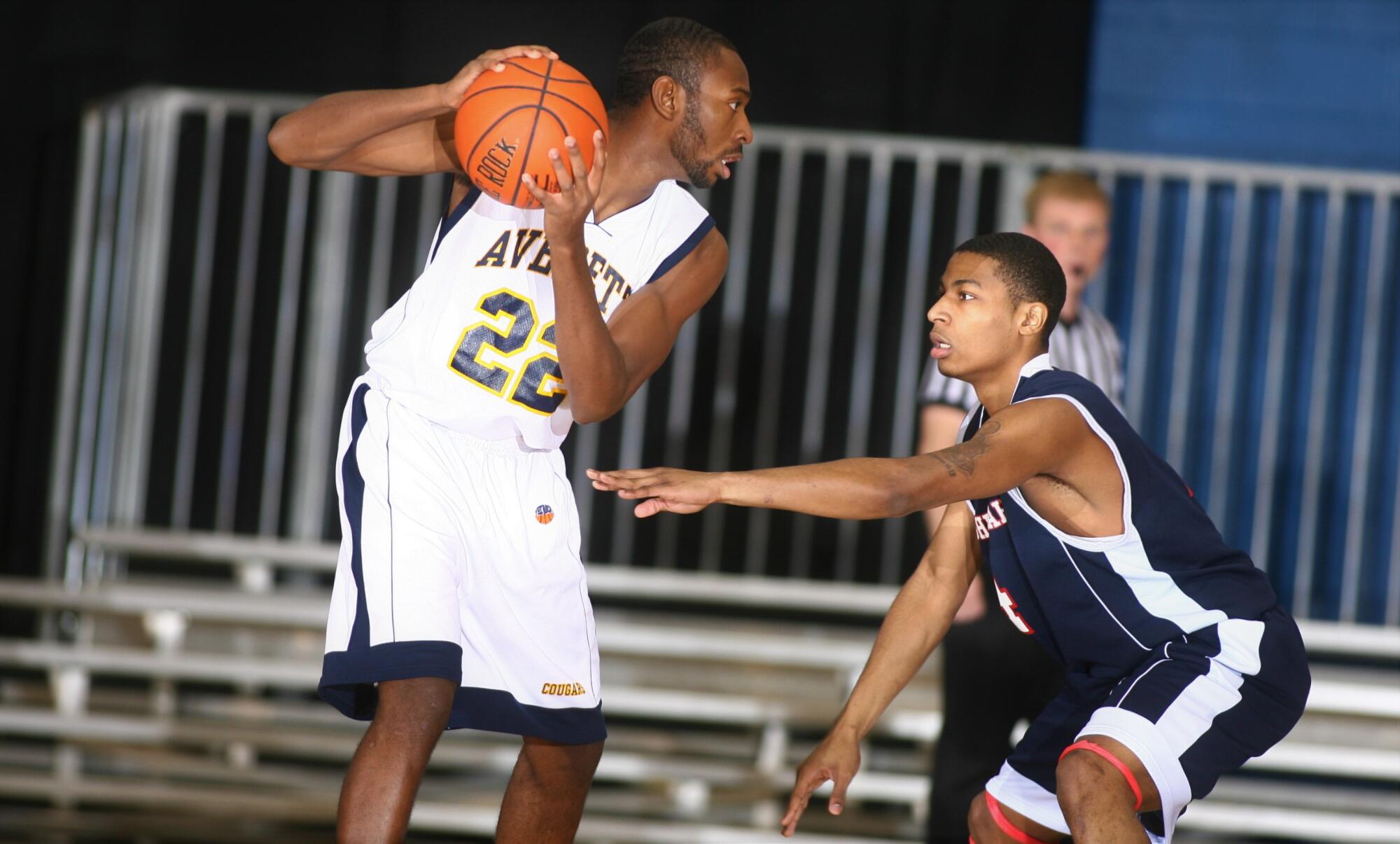
That wasn’t his destiny, he felt. So Pierce lived in that office for three years, hearing persistent encouragement from trainers, feeling flashes of validation from working out alongside NBA players.
He came to view his situation as a blessing. He could roll out of bed in the morning, head downstairs and walk onto a court with a shooting machine.
“We have to be willing to make the sacrifice it takes to get there,” Pierce said, “because otherwise you’ll rot away trying to figure out why it’s not working.”
Eventually, the hard work paid off with the Costa Rica gig. After Pierce finished torching nets there, Creppy invited him to Uruguay, during the international signing period.
Pierce had poured seven years into this uncharted path of dream-chasing, seven years of sweat and tears and empty pockets. So he booked the one-way ticket. Now, after impressing in that showcase, Pierce is playing for Olivol Mundial of the Liga Uruguaya.
Life’s been weird. He’s living in a one-bedroom house with no central air conditioning. Back in Costa Rica, his coach was his roommate, and as they’d walk the streets every day, a parade of stray dogs and chickens would jaunt past.
Everything’s different. But it isn’t the inside of a gym office. Pierce isn’t going back.
More to Read
Go beyond the scoreboard
Get the latest on L.A.'s teams in the daily Sports Report newsletter.
You may occasionally receive promotional content from the Los Angeles Times.
